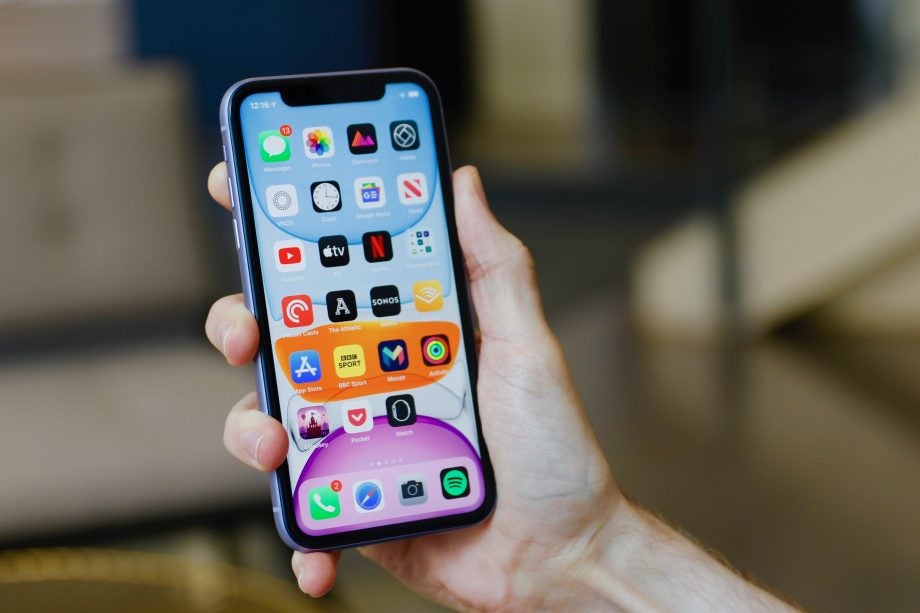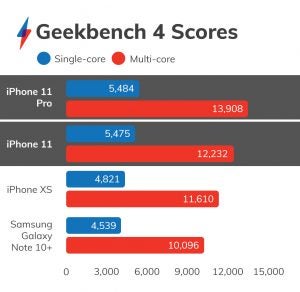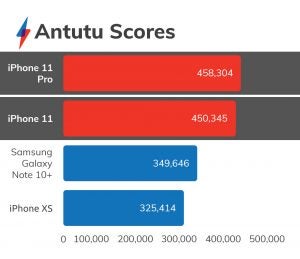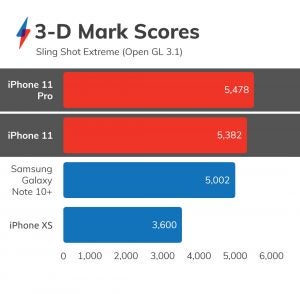iPhone 11 Performance
How good is the iPhone 11’s performance? The iPhone 11 is powered by the A13 Bionic, an update over the A12 Bionic There’s 4GB of RAM (according to Geekbench) and storage options consisting of 64GB, 128GB or 256GB It’s a seriously impressive performer both in real-world tests and benchmarks The A13 Bionic chipset is the […]

Sections
- Page 1 iPhone 11 Review
- Page 2 iPhone 11 Camera Review
- Page 3 iPhone 11 Battery Life Review
- Page 4 iPhone 11 Performance Review
Verdict
How good is the iPhone 11’s performance?
- The iPhone 11 is powered by the A13 Bionic, an update over the A12 Bionic
- There’s 4GB of RAM (according to Geekbench) and storage options consisting of 64GB, 128GB or 256GB
- It’s a seriously impressive performer both in real-world tests and benchmarks
The A13 Bionic chipset is the beefiest and most feature-packed chip ever on an iPhone, Along with powering basic functionality, it allows for features like 4K60fps video capture across each camera, Slofies and the updated Smart HDR functions. You might not notice an obvious performance right away, but that little chip is doing a lot of work across the iPhone 11.

Now let’s dive into the specs of this chipset. A13 Bionic was called Apple’s “Most efficient chip to date” during its unveiling and it uses the second generation of Apple’s 7nm (nanometre) process, which packs 8.5 billion transistors onto each chip. That’s up from the 6.9 billion transistors of the A12 Bionic.
- Which is the best iPhone?
The A13 Bionic system-on-chip (SOC) features 18 cores: six-core CPU, four-core GPU, and an eight-core Neural Engine processor, which is dedicated to handling on-board machine learning processes. Four of the six cores on the CPU are low-powered, dedicated to handling basic phone operations, while two bigger performance cores won’t kick in until you’re doing something a lot more taxing.
It’s a little disappointing to see 64GB remain the base storage – 128GB seems a lot fairer – and there’s no 5G support on any of Apple’s new iPhones. RAM has jumped from 3GB to 4GB, according to the Geekbench app, when compared to the iPhone XR.
Related: 5G in the UK
iPhone 11 processor performance – Geekbench
Geekbench is a CPU-focused benchmarking tool. It is likely the most well-known benchmarking tool and commonly used to give a good look at how well a phone performs.
We run all the phones we review through Geekbench since it offers a general score for overall performance. As with all benchmarking scores, they don’t necessarily mean a phone will be an excellent performer and are more for an overview.

The iPhone 11 gets comfortably higher Geekbench scores than the Note 10+
Results given by the tool comprise of scores for single-core and multi-core performance. Apple has previously excelled in both these areas, especially single-core, and that’s once again the case here.
The results produced by the iPhone 11 are the best we’ve seen from a phone and considering Apple regularly tops these charts every year that’s not much of a surprise.
Related: Best iPhone Deals
iPhone 11 overall system performance – AnTuTu
AnTuTu is a generalist benchmark that synthetically tests everything from theoretical gaming performance to picture editing and basic web browsing. As is the case with Geekbench, the iPhone 11 once again tops the charts when compared to other 2019 flagship phones we’ve tested.

iPhone 11 graphics performance – 3DMark
3DMark’s Sling Shot benchmark focuses on checking a phone’s GPU performance. As you can see in the graph below the iPhone 11 is a marked improvement on the iPhone XS and the recently released Galaxy Note 10+



